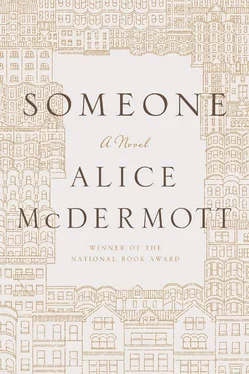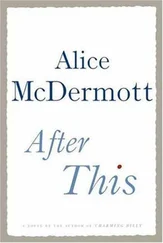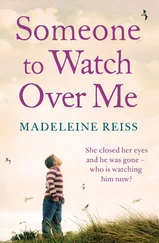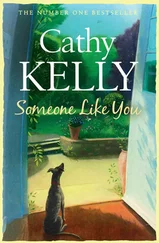We were silent for a moment, and I could see reflected in his face the uncertainty with which the three of us had received his tale.
“And I don’t mean Bob Hope,” he said suddenly, as if this had been his hidden punch line all along.
We laughed, and he brushed his hands together, ridding them of the imagined earth and paint and saliva. “So that’s my war story,” he said with a grin.
“And how did you come to be there?” Gabe asked him. “In the camp?” He said it softly, as if he were speaking to a penitent. His own time on the army air force base in England had been, as far as my mother and I could tell, a triumph. He’d been promoted twice. A glorified paper pusher was how he put it when he returned, all modesty.
Tom shifted in the chair, glanced at me, and smiled. “Jerry caught us on a return run,” he said lightly. “Battered us but good. We had to bail.” He made a stage grimace. He might well have had some vaudeville in his blood. “That’s when I figured I was done for.”
His parachute training, he said, had been short and perfunctory, and after a few easy missions, he’d stopped even imagining himself jumping out of a plane. When the order came, the plane shuddering—like a subway car going over cobblestones, if you can imagine it, he said—he was pretty sure he couldn’t do it. He gripped the door. He seriously considered just hanging on. Going down with the ship. But then he felt a push from behind, and then he dropped into the worst nightmare anybody ever had: cloud, smoke, the thick smell of the fuel. A dream’s endless falling.
He laughed telling it, as if it were a joke and the joke was on him. Through the years, he would always tell it this way. It was the way even our children retold it.
He said he remembered only after he had pulled the parachute cord—touching his forehead in a comic gesture of despair—that he was supposed to count to ten before he pulled it. And then he counted anyway, a second too late, foolishly, all apologetic, as if he thought that if he counted with enough sincerity, the parachute wouldn’t notice he was counting too late. And then he counted again. All the way down, he kept counting to ten. He surprised himself, he said, thinking back on it. He surprised himself that he kept counting like that, going down, when what he should have been doing was saying his prayers.
And then out of the noise of the worst and loudest sound he had ever heard and hoped never to hear again he fell into dead silence. Nothing at all, he said—and held out his hands and made his eyes wide to replicate his astonishment.
So suddenly quiet that he thought his ears were blown out for good. He saw the air was now blue and there was a serene patchwork world beneath him. Even children running across a churchyard, into a field, and he thought—“I kid you not,” he said in his the-joke’s-on-me way—“Now, this isn’t so bad. I could get used to this.”
He was floating peacefully; there was some sunshine. The children with their open mouths were like a voiceless chorus beneath him. The terror had vanished, so too the bitter trembling. He thought, he said, “This might be even better than living.”
The children were the first to reach him when he fell, tumbling back to the hard earth, busting up his shoulder, breaking his wrist.
“But those kids,” he said, “that was the luck of the Irish, it turned out.” And he gave a kind of salute to my mother, as if she had arranged things.
Because, he said, the next thing he knew, a mad old Kraut was pointing a Luger at his head, so close that he could smell the hot metal, as if it had just been fired. “He was in a tizzy,” Tom said. “Mad as hell,” and he apologized to my mother again for his language. “I couldn’t understand anything he said but Kinder , waving the goddamn gun”—he apologized again—“and telling me, I guess, that he’d like to blow my brains out except for the kids who were there, all around us. He even tried to chase them away, but they were having too much fun, throwing little handfuls of mud in my direction, yelling their heads off. So much excitement. You know how kids are.” He laughed and touched his fingers to the teacup. “The crazy old Kraut had enough decency not to want to shoot me in front of them.”
My mother put her hands to her lips and said, “Glory be.”
Tom gave a self-deprecating wave of his hand. “Well,” he said, “to make a long story short, a German officer showed up—officer, hell, he looked all of eighteen, like a choirboy—and gave the old man Hail Columbia in German, and then told me in English, in so many words, to get out of the harness and follow him— mach schnell —if I wanted to live. It took me a few minutes to get it. I thought I was already dead.”
He laughed again, his face flushed under the light of the chandelier. He was enjoying our attention. He was a man who loved to talk.
“This fellow grabbed me under the arm. I was still wobbly kneed, shaking like a leaf, but he got me the hell out of there. He told me the old man was crazy, crazy with grief. He’d learned just the day before that his son, his only child, a German airman, had been killed by the Allies. So he was out for revenge. He would have put a bullet in my head if those kids hadn’t been there.”
“An eye for an eye,” Gabe said.
Tom sat forward. He shook his head. “But here’s the thing,” he said. He was smiling oddly, with less mirth than before. “Here’s the way I looked at it. And believe me, I had plenty of time to look at it. If the old guy had shot me, then and there, it wouldn’t have been the same. It wouldn’t have been equal.”
He turned to my mother, as if she alone needed an explanation. “I was an orphan, you see,” he told her. “A foundling-home kid. I had no father to grieve for me.” He looked to Gabe again. “So it wouldn’t have evened out, if he’d shot me right then and there. There would have been no counterpart, no American counterpart, so to speak, to match that poor old Kraut and his grief. There still would have been more pain on his side of it. The pain of a father losing a child. There wouldn’t have been any pain like that on my side, since I had no father. So it wouldn’t have been equal.”
Suddenly he lifted his eyes to the chandelier above the table, and I was both embarrassed and dismayed to see the light there reflect a sudden tear. I saw his throat move as he swallowed with some difficulty. There was, I thought, something unmanly about all this, not just the sudden emotion, but the stream of talk. I was used to more reticence at this table. And yet, there was also the unmistakable tug of sympathy for a guy who had been through so much.
There was an awkward silence—even with all my expertise I struggled to find a word of comfort. And then Gabe said softly, “We’re all of equal value in the eyes of God.”
Tom turned to him with some admiration. I was relieved to see that the tear in his eye hadn’t fallen. He brushed it away with his knuckle. “Well, that’s a nicer way to think of it,” he said. He said, “That’s a good point to consider,” and smiled again before he added, “But that don’t mean some of us won’t leave this world without anyone much taking notice.”
The platter at the center of the table was empty, and I stood to gather the plates. With some intention, I touched my hip to Tom’s arm as I leaned to reach his. He turned his head a bit, smiling, his ear somewhere in the vicinity of my breast and my heart. There was the unmistakable tug of sympathy for a guy who had known such loneliness.
I took a few minutes in the kitchen, rinsing the plates, refilling the kettle, resisting something I couldn’t define. I heard my mother telling him, “Only these two. But my husband used to say we’ve run the gamut, seeing how different they were. Different as night and day.”
Читать дальше












